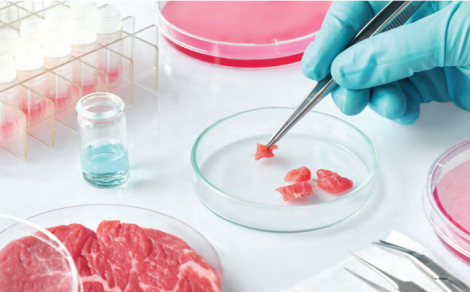Industry-scale production of cultivated meat and the importance of valve contr

Kieran Bennett, Industry Account Manager for Food & Beverage applications at Bürkert, discusses the importance of bioreactor controls for scaling-up cultivated meat production
Grown from animal cells, cultivated meat has the potential to provide a more environmentally friendly alternative, that is also free from animal harm. Currently, production is laboratory-scale, and expanding to industrial levels could enable this new food to reach our supermarkets. To achieve this, the accurate environmental control of the bioreaction process is essential, meaning that gas flow and temperature regulation with optimised valve systems will be a vital requirement.
Cultivated meat, produced by growing animal muscle cells, has the potential to revolutionise global nutrition. This ‘new food’ could remove primary ethical concerns surrounding animal care, and help reduce global warming, as well as minimise wider environmental challenges as a result of intensive farming.
Producing cultivated meat is achieved through cellular agriculture. A sample of cells is obtained from a donor animal by a physically harmless biopsy. Myocyte cells, the most common cells used to produce cultivated meat, are then separated and placed into a medium, such as a microalgae base, which is rich in the nutrients essential to cell reproduction. For the cells to achieve sufficient yield through further growth, maintaining the precise environmental conditions within the bioreaction process is also crucial.
Scaling-up production
One major challenge the new food industry faces is the need to scale-up production. Although the current price of a cultivated meat burger is, theoretically, around €91, this value has decreased significantly since production of the first lab-grown patty in 2013, which reportedly cost nearly €300,0002. Growing cultivated meat remains at laboratory scale, and before this new food can reach the supermarket, the cost of production needs to decrease further still.
Companies like Zeta are developing systems for meat and fish cell cultivation that have the potential to increase the scale of production over time. Large-scale bioreactors and fermenters that can efficiently create higher yields are required, and to ensure precise environmental control within these cell cultivation vessels, precision process control is vital.
A crucial factor to ensure that the initial cells multiply is temperature control. If the cells are not incubated at a precise temperature, they will die Temperature control remains vital throughout the cultivation process to optimise yield, as well as quality. Within the bioreactor, precise gas control is also essential, ensuring the correct inlet of gases such as oxygen, as well as the dissipation of carbon dioxide, and the maintenance of the necessary pH level. A sterile environment is also a prerequisite. Quality, quantity, and safety of production depend on hygiene - and future regulation will hinge on this too.
Valve control
Central to gas and temperature control in cultivated meat production is the valve system. Kieran Bennett, Industry Account Manager for Food & Beverage applications at Bürkert explains that Zeta has developed a cultivated meat system in conjunction with Bürkert’s flow control technology that optimises fermentation gas dosing. While companies like Zeta are pioneers in this new field, in many respects, the control technology is already well-established. The exact parameters of temperature and gas modulation to optimise cell yield are still in development. However, cultivated meat production is set to involve industrial-scale bioreactors, controlled by systems like those supplied today by Bürkert to the pharmaceutical sector.
-
SMART Manufacturing & Engineering Week
04 - 05 June, 2025
NEC, Birmingham UK -
PPMA 2025
23 September, 2025, 9:30 - 25 September, 2025, 16:00
NEC, Birmingham UK -
Advanced Engineering Show 2025
29 October, 2025, 9:00 - 30 October, 2025, 16:00
NEC, Birmingham UK










